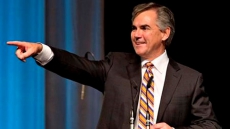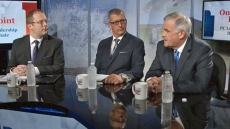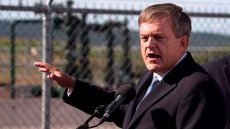UNITED NATIONS, United States - In a year of violence and geopolitical chaos, Prime Minister Stephen Harper used a surprising speech to the United Nations General Assembly to emphasize themes of peace and optimism.
The prime minister's third address to the chamber was remarkable for what it did not include: the words "Iraq" or "Russia."
He did, however, refer to Tanzania and Senegal. He called for a birth certificate for every child. And he did this while speaking at length about newborns' health, which he has identified as his No. 1 foreign-development priority.
The speech began with a description of root causes of global instability: a lack of freedom, democracy, rule of law and economic opportunity.
He did mention in passing that Canada has fought aggression, but he elaborated at far greater length on possible antidotes to global instability — free trade, and human health.
As it turned out, the prime minister's speech to the UN this week wound up being more dovish than that of U.S. President Barack Obama, who spoke about Islamist rebels as a network of death.
This was on a day that America, and its financial markets, were made jittery by warnings by the Iraqi government that foreign fighters might be planning to strike the West — perhaps even New York.
But Harper stuck to his planned text, and spoke of places and issues less likely to grab the daily headlines.
"There are many individual countries and specific causes that will rightly occupy your deliberations here this week," Harper told the general assembly hall, speaking there for the third time, and the first since 2010.
"Let's also not forget to also look beyond those crises, at the long-term opportunities and efforts that can truly transform our world.
"We have it in our power to create a better kind of world for our children's children than we have today. And we should."
He concluded by observing that humanity had made tremendous progress in his lifetime, despite its setbacks.
The assembly hall, which was about half-full for his late-evening speech, applauded twice as he discussed maternal health. One European TV reporter, up in the press gallery, politely joined in too.
An aide to the prime minister explained that, no, Stephen Harper hadn't suddenly gone soft in his views on foreign policy.
But he said Harper's positions are well known on issues like the crisis in the Ukraine, and the threat by Islamist rebels. He said the prime minister wanted to use the occasion to draw attention to other issues dear to him.
Earlier Thursday, Harper announced Canada will contribute to a new international fund to prevent maternal and newborn deaths, as part of what he calls his top development priority.
Harper and the representatives of several other national governments announced their plans to help set up a US$4 billion fund to be run by the World Bank.
The Global Financing Facility will aim to build a pool of private-sector money as well, to help reduce mortality rates and to create better data-gathering systems.
Harper made the announcement at the UN, pledging $200 million in Canadian money, which will flow from the $3.5 billion he promised earlier this year at a summit held in Canada.
Maternal and newborn deaths have plummeted over the last two decades, but not enough to meet the UN's Millennium Development Goals. Harper said he's glad the cause has momentum on its side.
"I'm pleased to see that not only do these meetings keep growing in size, but so do commitments," Harper said, referring to progress since he put the issue on the agenda of a G8 meeting in Muskoka in 2010.
At the announcement, he turned to the World Bank president seated next to him, Jim Yong Kim, and made a tongue-in-cheek reference to the plan to leverage private money: "I want to congratulate Jim and the World Bank," Harper said, "for using the financial expertise of Wall Street for good."
The head of UNICEF Canada said the government's work on that file is being noticed among his colleagues elsewhere in the world.
David Morley said the solutions to maternal and newborn deaths are relatively simple — they just require money and political will.
He cited three areas in particular: more trained nurses in outlying communities; better access to telecommunicatons technology, like text messaging; and cooling equipment to keep vaccines cold during transportation.
The UN Millennium Development Goals set out a target of reducing the under-five mortality rate by two-thirds between 1990 and 2015.
That target won't be achieved, as was emphasized in a new UNICEF report.
But that report also concluded that the number of deaths has declined by half — not only in absolute terms, but also per capita — dropping from 90 to 46 deaths per 1,000 live births in 2013.
"These are impressive numbers in a conference room in New York. They are even more meaningful in hospitals," said UN Secretary-General Ban Ki-moon, who appeared at the event before Harper and colleagues from Norway and the U.S. spoke.
"In today's troubled world, our progress in this area shines brightly. It demonstrates what we can achieve when we come together."
Morley called it a "child-survival revolution." Someone else who works with the Canadian government on the file saluted the commitment.
"(Harper) could have chosen so many other issues at the time he hosted the G8," said Rosemary McCarney, a spokeswoman for the Canadian Network For Maternal, Newborn and Child Health.
"He could have chosen a trade issue, or a fiscal policy issue, but he chose this issue."




